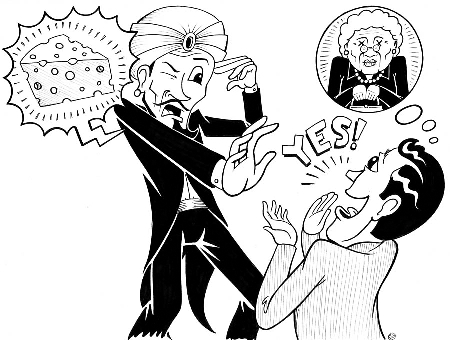On Jan. 31, I woke up to hear a man named Robert Baca on the 94 Rock Morning Show claiming to talk to the dead. He did readings for TJ Trout and the 94 Rock crew and their callers, offering what sometimes seemed to be “amazingly accurate” information from beyond the grave, such as telling subjects that they owned a deceased loved one’s ring or that the subject had a “father figure” whose name has a “B” and who died suddenly. I have studied the techniques psychics use for many years, and I listened carefully to see if Baca brought anything new to the table. Unfortunately, it was the same old schtick. Can Baca speak to the dead? It’s possible, though he did nothing that can’t be explained by ordinary means. His techniques have been around for decades and are familiar to psychologists (Psych happens to be my undergrad degree). Psychic mediums have been scientifically tested, and when they are right it is often because they use some or all of the following techniques: 1) Cold reading: Basically, making good guesses or logical conclusions that seem to be specific. My favorite example was when I saw a “psychic” tell an obese Black woman her spirit guide was warning her about getting diabetes. 2) Retrofitting: This is the most important psychological tool in convincing people that psychics are real. It is very powerful for both the psychic and the subject, and often neither is aware of it. It is important to understand that just because a subject can find a match or “make it fit” (i.e. make some connection between a dead person and what the psychic said about him or her) does not mean the information is correct. For example, if Baca tells a subject, “I’m seeing your grandmother, she’s holding her hands by her chest … Do you understand this?” the subject can probably think of dozens of reasons why that might be “correct”: Maybe she prayed a lot; maybe she had arthritis and often warmed her hands by a fire; maybe she died of throat cancer and is signaling that by motioning to her throat; maybe she worked as a manicurist, and so on. If just one of these many interpretations or memories “matches,” the subject may be convinced the psychic has made some sort of contact and gave accurate information, when in fact all the work was done by the medium’s and subject’s own imagination and creativity. 3) “Shotgun effect”: If you make enough guesses, you will be right eventually. Baca has a near-auctioneer rapid-fire delivery and throws out a dozen or more statements in the space of 30 seconds, hoping at least some of them are right. 4) Delayed confirmation: This is common when psychic information is wrong or not understood. If Baca says something the subject cannot confirm, he does not admit he is wrong but instead insists that “You will understand it later.” Maybe they will, maybe they won’t, but it’s an easy way to make failure look like success. Of course, you don’t need to understand these psychological processes to use them effectively, just as you don’t need to know what a verb is to write a sentence. Most psychic mediums use these techniques without knowing it, convincing themselves and others that they can communicate with spirits.If you listen carefully to Baca’s readings, there is good evidence that he is not getting information from spirits. He is not producing any information the subject does not already know: Every single “accurate” statement Baca made was already known by the subject; there is no new information in the conversation, no evidence that a third-party spirit is telling the psychic anything. Why would the spirit, contacting a loved one for the first time, basically say, “As you know, you have my ring,” or “As you know, I died suddenly of a problem in my chest”? Real evidence of communication with the dead would be verifiable information only the deceased would know, that neither the medium nor the subject knows. For example, if the medium gave an accurate answer for a subject who asks the spirit, “Grandma, we’re looking for your will, where is it?” or “Spirit of Steve Fossett, please tell us where your plane crashed.” Why does this never happen? Think about it. Most psychic mediums are caring, compassionate people who genuinely believe they are helping others with their gifts. They are simply unaware of the psychological principles that make them appear to be correct. Even though personal experience is a deeply flawed guide to the truth, that’s enough for most psychics and mediums—“I just know what I can do, and that’s it!” Psychics are usually not interested in being tested, though they should be—not because they have anything to prove to skeptics, but for themselves. They should seek out objective, scientific testing to make sure they are not mistaking ordinary psychological processes for the ability to speak to the dead. Given Baca’s hectic media appearance schedule, he’s probably too busy to verify his powers.
Benjamin Radford has investigated mysterious and unexplained phenomena for more than a decade. He is a columnist for LiveScience.com and managing editor of Skeptical Inquirer science magazine. His latest book is Lake Monster Mysteries , available at his website: www.RadfordBooks.com.





